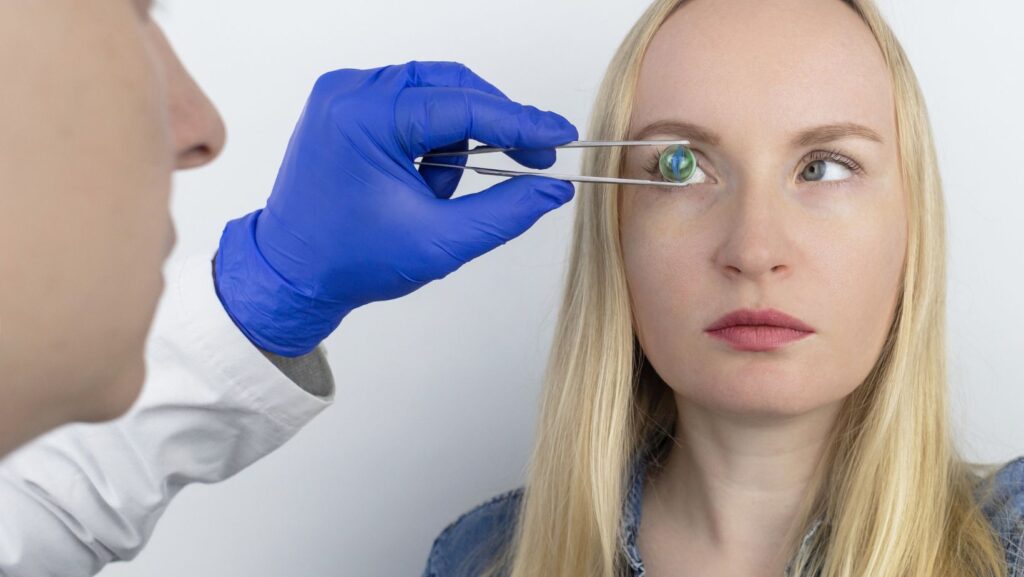UV rays are part of the sunlight that reaches the earth. They are invisible but can cause significant damage. There are three types: UVA, UVB, and UVC. While UVC rays are absorbed by the atmosphere, UVA and UVB rays reach your eyes and skin.
Prolonged exposure can harm different parts of the eye, including the cornea, lens, and retina. Conditions such as cataracts, macular degeneration, and even certain eye cancers are linked to UV exposure. Knowing the risks is the first step toward prevention.
The Link Between Sunlight and Common Eye Problems
Cataracts
Cataracts occur when the eye’s lens becomes cloudy, leading to blurry or dimmed vision. UV exposure accelerates this process, increasing the risk of developing cataracts at an earlier age.
Macular Degeneration
The macula is the part of the retina responsible for sharp central vision. Long-term exposure to UV rays can damage this area, leading to vision loss over time.
Photokeratitis
This painful condition is essentially a sunburn on your cornea. It can result from intense UV exposure and typically causes temporary vision loss or discomfort.
Simple Tips to Protect Your Eyes
Wear Sunglasses with UV Protection
Choose sunglasses labeled “100% UV protection.” This ensures they block both UVA and UVB rays. Larger lenses or wraparound styles provide added coverage, protecting your eyes and the delicate skin around them.
Use Hats for Additional Shade
A wide-brimmed hat can reduce UV exposure by up to 50%. This simple accessory shields your face and eyes, making it an excellent complement to UV-blocking sunglasses.
Avoid Peak Sunlight Hours
UV rays are strongest between 10 a.m. and 4 p.m. Limiting outdoor activities during these hours reduces the likelihood of UV-related eye damage.
Opt for UV-Blocking Contact Lenses
Many modern contact lenses include UV-blocking properties.

These lenses add an extra layer of defense but should always be paired with sunglasses for complete protection.
The Role of Regular Eye Exams
Eye exams are critical for detecting early signs of UV damage. An eye care specialist can monitor your vision and recommend preventative measures tailored to your needs. Clinics like SuraVision offer comprehensive eye exams to ensure long-term eye health. They also provide advanced treatments such as Evo Visian ICL, which can correct vision while reducing UV exposure risks.
The Importance of Eye Protection for Children
Children Are More Vulnerable: Children’s eyes are more sensitive to UV rays than adults’. Their lenses allow more UV light to penetrate, which increases the risk of damage.
Encourage Early Habits: Teaching children to wear sunglasses and hats during outdoor activities helps establish protective habits early. This can significantly reduce their long-term risk of eye diseases.
The Benefits of Nutrition for Eye Health
- Vitamin A: Vitamin A is essential for maintaining good vision. Foods like carrots, sweet potatoes, and spinach are rich sources.
- Lutein and Zeaxanthin: These antioxidants protect the retina from damage. Green leafy vegetables and eggs are excellent sources.
- Omega-3 Fatty Acids: Omega-3s support overall eye health and can reduce the risk of macular degeneration. Include fatty fish like salmon or walnuts in your diet for these benefits.
Myths About UV Protection
Cloudy Days Are Safe – UV rays penetrate clouds, making eye protection necessary even on overcast days.
Only Sunglasses Provide Protection – While sunglasses are vital, other measures like hats and UV-blocking lenses enhance safety.
UV Damage Is Only a Summer Concern – UV rays are present year-round. Snow and water can reflect UV light, increasing exposure in winter and near bodies of water.
Taking Action Today
Protecting your eyes from UV damage requires simple, consistent actions. Wearing sunglasses, wearing hats, and maintaining regular eye exams are crucial steps.

Clinics like SuraVision offer solutions tailored to your needs, including Evo Visian ICL from SuraVision for those seeking advanced vision correction and UV protection. Start taking these steps today to ensure clear and healthy vision for years to come.
